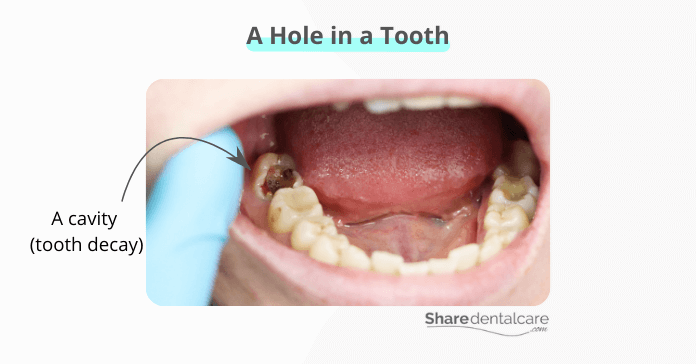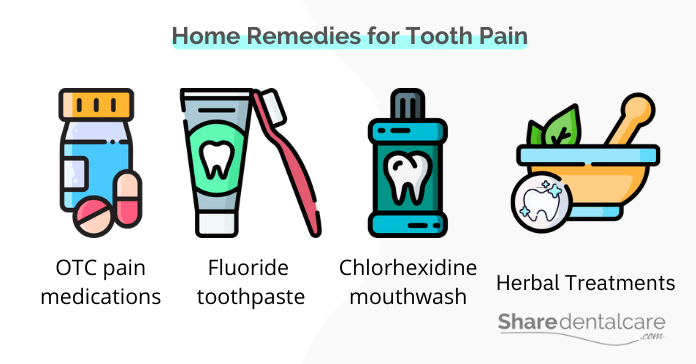Do you have a hole in your tooth causing pain, and you are looking for relief? Many people experience horrible tooth pain, which can affect every aspect of their life; from their work to their relationships. It can be difficult to concentrate on anything when you’re in pain, and it’s hard to be social or feel happy when you’re hurting. But there are ways to manage pain and get your life back on track. In this post, We’ll discuss pain relief for a hole in your tooth.
Why is the Hole in My Tooth Causing Pain?
A hole or cavity can develop in a tooth when the protective outer layer, known as the enamel, is weakened or eroded by the acids produced by bacteria in the mouth. This can lead to sensitivity, pain, and even infection in the affected tooth. You can read more about how dental caries develop.
A hole in your tooth can cause pain for many reasons; the cavity is deep enough to irritate the nerve inside the tooth and cause inflammation, or bacteria have entered the tooth pulp through the cavity, causing an infection. The type of pain may vary depending on the size of the cavity and how deep it is.
- Sensitivity to colds and sweets: If your cavity is small, you may experience momentary pain when eating sweet or cold foods. You may also experience sensitivity due to receding gums.
- Dull ache tooth pain: This could be an indication of something minor like food lodged between teeth or a sign that you may have tooth decay.
- Sharp pain: If the cavity is larger and extends deeper, you may experience more intense pain due to the nerve being irritated.
- Constant, throbbing pain: If the cavity is too deep and has caused an infection, you may experience a constant throbbing in the area. You may also have pain when you bite down or chew.
If you are experiencing any of these symptoms, you should visit your dentist for diagnosis and treatment. While you are waiting for your dental appointment to treat the hole in your tooth, there are some things you can do at home for temporary relief.

Home Remedies to Relieve Tooth Pain
These home remedies can help provide some temporary relief from hole-in-tooth pain:
- Over-the-counter pain medication: You can take over-the-counter medications such as ibuprofen or acetaminophen to help relieve pain and inflammation. Be sure to follow the instructions on the package.
- Brush with fluoride toothpaste: Brushing your teeth with fluoride toothpaste can help reduce pain and keep the hole in your tooth clean.
- Floss gently: Flossing can help remove food particles and bacteria that may be causing pain.
- Chlorhexidine mouthwash: Chlorhexidine is an antiseptic and disinfectant that can help reduce the bacteria in your mouth.
- Oil pulling: Oil pulling is an ancient practice that can help relieve tooth pain. To do oil pulling, swish 1 teaspoon of coconut oil or sesame oil in your mouth for 10-20 minutes, then spit it out.
- Eat licorice root: Licorice root has natural antibacterial properties that can kill bacteria in the hole in your tooth, reducing pain.
These home remedies can provide some temporary relief from hole-in-tooth pain. However, it is important that you visit your dentist as soon as possible for diagnosis and treatment. Your dentist will be able to treat the underlying cause of your pain.

Why it is Important to Visit a Dentist?
It is important to visit a dentist for diagnosis and treatment of cavities. If left untreated, cavities can worsen and cause even more pain or infection. Also, the infection may spread to other parts of the body, causing more serious health problems. Complications from untreated cavities include:
- Dental abscess: A dental abscess is a pus-filled pocket that forms around the tooth due to an infection. It can cause severe pain and swelling.
- Tooth loss: Untreated cavities can weaken the tooth, causing it to break and eventually need to be removed.
- Serious health conditions: Untreated cavities can cause infection to spread beyond the mouth, leading to serious illnesses such as sepsis and Ludwig’s angina, which are life-threatening.
If you have a hole in your tooth, it is important to visit the dentist as soon as possible to prevent any of these complications.
Tooth Hole Treatments & Relief Pain
Your dentist will determine the best treatment for your cavity depending on the size and severity of the cavity. Common treatments include:
- Fillings: Fillings are used to fill cavities and prevent further decay. There are several types of fillings available, including amalgam (silver), composite (tooth-colored), and gold.
- Crowns: A crown is a cap that covers damaged teeth to protect them from further damage.
- Root canal: If the cavity is too deep and has caused an infection, your dentist may recommend a root canal to remove the infected tissue.
- Tooth extraction: If the tooth is severely damaged and cannot be saved, your dentist may recommend a surgical extraction.
Your dentist will discuss treatment options with you and recommend the best treatment for the hole in your tooth and pain relief
Hole in Tooth Pain Relief – Conclusion
Cavities can be a painful experience, but with the proper treatment, it can be managed. Visit your dentist as soon as possible for diagnosis and treatment. While you wait to see your dentist, home remedies can provide some temporary relief from the pain caused by a tooth hole. There are a variety of treatments available, depending on the size and severity of the cavity, including fillings, crowns, root canals, and tooth extraction. If left untreated, cavities can worsen and lead to more serious complications.